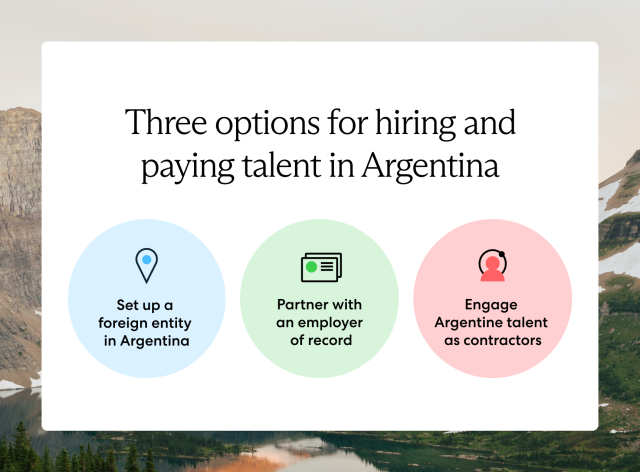Argentina offers many opportunities to businesses looking to expand their global workforce and hire internationally.
With one of the largest economies in South America, a similar time zone alignment with the U.S., and a prevalent English-speaking population, Argentina is a savvy business move for U.S. companies building their international presence.
Argentina also boasts a quality talent pool, rich tech culture, and favorable remote work policies.
Before hiring and paying remote talent in Argentina, employers must understand the country’s labor laws, tax requirements, and compliance risks. In this guide, learn your options for hiring remote employees in Argentina, key employment laws to know, and compliance risks to avoid.
How can U.S. employers hire and pay remote employees in Argentina?
While U.S. companies can hire employees in Argentina, the country’s employment laws vary significantly from those in the U.S. The three options to hire Argentine employees and comply with local labor requirements include the following:

1. Set up a foreign entity in Argentina
If a U.S. company has an extensive budget and plans to establish a long-term presence or hire a large team in Argentina, it may consider setting up an entity in Argentina.
By setting up an entity in Argentina, foreign businesses receive direct access to the market, granting them full autonomy to compliantly hire talent and run payroll in-house.
However, entity establishment is time-consuming and expensive. It also requires in-depth knowledge of Argentina’s corporate, legal, employment, and payroll regulations.
Entity establishment can also take months, and language and cultural barriers may create further compilations or delays.
2. Partner with an employer of record in Argentina
A simpler alternative to entity establishment is partnering with an employer of record (EOR) in Argentina to hire and pay employees in the country.
An EOR serves as a legal entity in the country and hires, pays, and manages employees in Argentina and global markets on your behalf. An EOR has in-country knowledge of local employment and tax laws to ensure you remain compliant when building a distributed workforce.
An EOR handles hiring, onboarding, payroll, benefits administration, talent relocation, and risk mitigation on your behalf while you maintain control of all day-to-day management responsibilities.
Partnering with an EOR is a great option for businesses that want to test the Argentine market, quickly engage local talent, and lower their financial commitment and legal risk of hiring and paying remote employees in Argentina.
Learn more: What Is an Employer of Record (EOR)?
3. Engage contractors in Argentina
Alternatively, a U.S. company may engage contractors in Argentina for short-term projects or services instead of hiring and paying full-time employees.
Engaging contractors does not require entity establishment in the country, nor do U.S. employers have to pay employment taxes or provide benefits to contractors.
While engaging contractors in Argentina may provide companies with more flexibility and cost-saving opportunities, it also exposes them to misclassification risks and may negatively impact long-term business goals. This guide explains the risks of misclassification in greater detail below.
Learn more: Should You Hire an Employee or Contractor?
What to know before hiring employees in Argentina
Global companies must learn and comply with country-specific employment laws and regulations before hiring and paying remote employees in Argentina.
Argentina employment laws
Argentina's employment laws are designed to protect the rights of employees and workers. The following employment laws and practices apply to companies hiring talent in Argentina:
- National minimum wage. Employees in Argentina are entitled to earn a monthly minimum wage of about ARS 65,427, or US$281, per month.
- Overtime. Working hours in Argentina are eight hours per day and 48 hours per week. Employees working overtime receive 150% of their regular pay and 200% on holidays, Sundays, and rest days. Overtime may not exceed three hours per day, 30 hours per month, or 200 hours per year.
- Paid time off. Argentinian employees receive up to 35 days of paid time off, or annual leave, each year. The amount of paid time off depends on their years with the company.
- Sick leave. Paid sick leave in Argentina depends on the employee’s years of service. Employees who have worked for an employer for less than five years receive up to three months’ paid sick leave per year, while employees who have worked for an employer for more than five years receive up to six months’ paid sick leave.
- Maternity and parental leave. Female employees are entitled to 90 days of maternity leave. They can split the leave by taking 45 days before and after birth or 30 days before birth and 60 days after birth. Male employees receive two days’ paternity leave unless their collective bargaining agreement establishes a longer period.
- Termination. Employees are entitled to one month’s notice period if they have worked for an employer for less than five years and two month’s notice period if they have worked for an employer for more than five years. Employers may choose to offer payment in lieu of notice in both cases.
- Severance. Employees who are terminated without just cause are entitled to one month's salary for each year of employment up to three years. Severance pay must include the notice period, remaining days within the calendar month, unused vacation, and accrued 13th-month pay.
- Holidays. Argentinians are entitled to 12 paid public holidays. Many Argentine holidays differ from U.S. holidays, including Carnival, National Day of Memory for Truth and Justice, Holy Friday, May Revolution Day, and Day of the Immaculate Conception of Mary.
13th-month pay
Employees in Argentina receive a statutory annual bonus, referred to as sueldo anual complementarioas or otherwise 13th-month pay.
Employers pay Argentine employees a 13th-month salary in two semi-annual installments on June 30 and December 18. Each payment equals 50% of the employee’s highest monthly salary accrued during the corresponding installment period.
Read more: The Complete Guide to 13th-Month Pay
Argentina payroll taxes
Argentina's employment laws require employers to contribute to social security, and employees must pay taxes on any worldwide income they receive.
Employer contributions
Employers with employees in Argentina must make social security contributions on their employees’ behalf. Social Security contributions cover the following:
- Pension
- Family allowance
- Medical care
- Unemployment
- Workers’ compensation
- Life insurance
- Pensioner’s healthcare fund
Employee income tax
Argentinian residents are taxed depending on their income bracket, with tax percentages ranging between 5% and 35%.
In 2023, employee income tax rates in Argentina are the following:
| Salary Range | Income Tax Rate |
|---|---|
| ARS 0 to 173,834.61 | 5% |
| ARS 173,834.61 to ARS 347,669.23 | 9% |
| ARS 347,669.23 to ARS 521,503.84 | 12% |
| ARS 521,503.84 to ARS 695,338.47 | 15% |
| ARS 695,338.47 to ARS 1,043,007.68 | 19% |
| ARS 1,043,007.68 to ARS 1,390,676.90 | 23% |
| ARS 1,390,676.90 to ARS 2,086,015.35 | 27% |
| ARS 2,086,015.35 to ARS 2,781,353.85 | 31% |
| Above ARS 2,781,353.85 | 35% |
Compliance risks when hiring and paying employees in Argentina
When hiring in Argentina, U.S. employers must understand the country’s regulations mandating employment, how they apply, and the risks involved if they want to maintain global compliance.
Varying labor and employment laws
Argentina's employment laws differ from U.S. labor regulations, which can be challenging for U.S. employers to understand, navigate, and comply with. Compliance is critical to managing an international workforce; failure to do so results in severe fines and legal consequences.
Employers hiring talent in Argentina must familiarize themselves with local labor laws to ensure their onboarding, employment, payroll, benefits, and termination processes are compliant.
Incorrect payroll contributions
Making incorrect payroll contributions directly affects critical payroll items like an employee’s take-home pay and social security. Also, employers who violate Argentine payroll compliance regulations may face fines, employee back pay, and other legal consequences.
Employers must keep up with Argentina’s changing regulations that impact payroll contributions, such as minimum wage increases, payroll tax rate adjustments, payroll deductions, and changes to statutory benefits.
Read also: The Complete Guide to Payroll Tax
Worker misclassification
Employers who engage contractors in Argentina instead of hiring full-time employees risk misclassification. Classification determines whether an employer must withhold and remit taxes on behalf of their Argentine talent and provide them with statutory benefits. Employers withhold taxes from an employee’s salary, while contractors pay a self-employment tax.
If an employer fails to classify employees and contractors correctly, they are liable for back pay for unpaid wages, benefits, and social security contributions. Additionally, misclassification can result in penalties for unpaid taxes, legal fines, and reputational damage.
U.S. companies engaging with contractors in Argentina should learn the classification requirements for both countries and use Form W-8BEN to determine the proper tax reporting and withholdings.
Read our complete guide to employee and contractor misclassification.
Permanent establishment
If a company has a physical presence in Argentina over a sustained period, it may trigger a permanent establishment and be liable to local corporate taxes.
Permanent establishment occurs if the company generates revenue from a fixed location in the country, regularly conducts business there, and wholly or partially operates its business through that location.
Companies must understand and identify permanent establishments in other countries or else risk noncompliance issues. These issues lead to severe penalties such as paying back unpaid taxes, employer liabilities, legal issues, and reputational damage.
Immigration requirements
Sometimes, a company may transfer international talent to live and work in Argentina. If so, they must understand and abide by the country’s immigration laws.
Obtaining the appropriate visas and work permits for foreign employees in Argentina depends on various factors, including the employee’s job, length of stay in the country, and whether they have a spouse and dependents coming with them.
Typically, the employer must sponsor their employee's visa, handle the work visa application, and pay the associated fees. The employee must have an entry permit to enter the country and obtain a residency permit and work visa from their local Argentine embassy or consulate.
Argentina embraces foreign, remote workers: In 2022, the country began implementing temporary visas targeting digital nomads to attract more people to live temporarily in Argentina.
Hire and pay remote employees in Argentina with Velocity Global
Hiring employees in Argentina offers many benefits for companies seeking to expand globally or build a distributed workforce. However, understanding and complying with the country’s local employment laws is complicated, overwhelming, and risky for foreign businesses.
Instead, partner with an EOR to simplify the hurdles of global hiring and payroll and make it easier to build and manage a global workforce.
As an industry-leading EOR, Velocity Global allows you to quickly and compliantly hire, pay, and manage employees in Argentina and more than 185 countries without the need for entity establishment or legal know-how.
Our Employer of Record (EOR) solution handles onboarding, payroll, benefits, HR support, and risk mitigation so you can focus on building a top team in Argentina and beyond.
Ready to engage talent in Argentina with speed and compliance? Contact Velocity Global to learn about our global workforce solutions.



